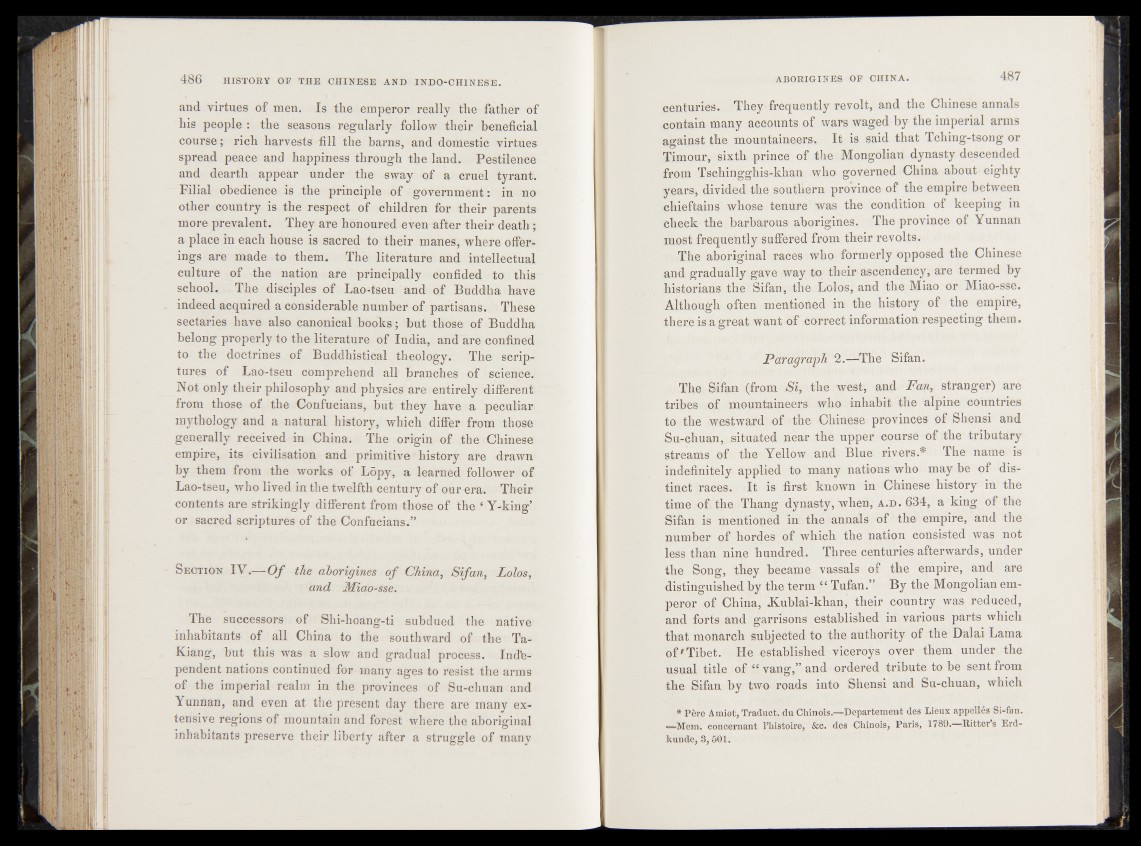
and virtues of men. Is the emperor realty the father of
his people: the seasons regularly follow their beneficial
course; rich harvests‘ fill the barns, and domesfeic virtues
spread peace and happiness through the land. Pestilence
and dearth appear under the sway of a eruek tyrant.
Filial obedience is the principle of -government: in no
other country is the respect of children for their parents
more prevalent. They are honoured even after their death;
a place in each house is sacred to their manes, where offerings
are made to them. The literature and intellectual
culture of the nation are principally confided to this
school. - The disciples of Lao-tseu and of Buddha hare
indeed acquired a considerable number of partisans. ' (These
sectaries have also canonical books ; but those of Buddha
belong property to the literature of India, aiid are confined
to the doctrines of Buddhistical theology. The scriptures
of Lao-tseu comprehend all branches of science.
Not only their philosophy and physics are entirely dififerent
from those of the Confucians, but they have a peculiar
mythology and a natural history r wbieh differ from those-
generally received in China. The origin of the; Chinese
empire, its civilisation and primitive' history are drawn
by them from the works of Lopy, a learned follower of
Lao-tseu, who lived in the twelfth century of ourera. Their
contents are strikingly different from those of the ‘ Y-king’
or sacred scriptures of the Confucians*”
S e c t io n IV— Of the aborigines of China, Sifan, Lolas,
■ and Miaa-sse.
The successors of Shi-hoang-ti subdued the native
inhabitants of all China to the southward of the Ta-
Kiang, hut this was a slow and gradual process. Independent
nations continued for many ages to resist the arms
of the imperial realm in the provinces of Su-chuan and
Yunnan, and even at the present day there are many extensive
regions of mountain and forest where the aboriginal
inhabitants preserve their liberty after a struggle of many
centuries. They* frequently revolt, and the Chinese annals
contain many aecotuits of wars waged by the imperial arms
against the mountaineers.. It is said that Tching-tsong or
Timour, sixth pjpnee of the f Mongolian dynasty descended
from Tschingghis-khan who governed China about eighty
years, divided the southern province of the empire between
chieftains whose tenure^ was the condition of keeping in
check the barbarous aborigines. The province of Yunnan
most, frequently suffered' from their revolts.
The aboriginal races who formerly opposed the Chinese
and gradually gaye way to their ascendency, are termed by
historians th© S>ifan; vtbe Lolos, and thé Miao or Miao-sse.
Although often mentioned in- the history of the empire,
thereds-a great want # éoweét information respieetihg them.
Paragraph 2.—The Sifan.
The Sifan (from ^ ihe west; and Fan, stranger) are
tribes of mountaineers who inhabit the alpine countries
t o , w e s t ward of the Chinese provinces of Shensi and
Su-chuan,^situated near the upper eoursè of-the tributary
streams of the Yellow and Blue rivers* The name is
indefinitely applied to many nations who may be of distinct
races. It is first known in Chinese history in the
time of the Thang dynasty, when, a.d. 634, a king of the
Sifan is mentioned in the annals of | the empire, and the
number of hordes of which the nation consisted was not
less than nine hundred. Three! centuries afterwards, under
the Song, they became vassals of the empire, and are
distinguished by the term “ Tufan.” By the Mongolian emperor
of China, -Kublai-khan, their country was reduced,
and forts and garrisons established in various parts which
that monarch subjected to the authority of the Dalai Lama
of'Tibet. He established viceroys over them under the
usual title of “ vang,” and ordered tribute to be sent from
the Sifan by two roads into Shensi and Su-chuan, which
* Père Amiot, Traduet. du Chinois.—Departement de« Lieux appellés Si-fan.
»»Mem. concernant l’histoire, &o* des Chinois, Paris, 1789.—Ritter’s Erd-
kunde, 3,501.